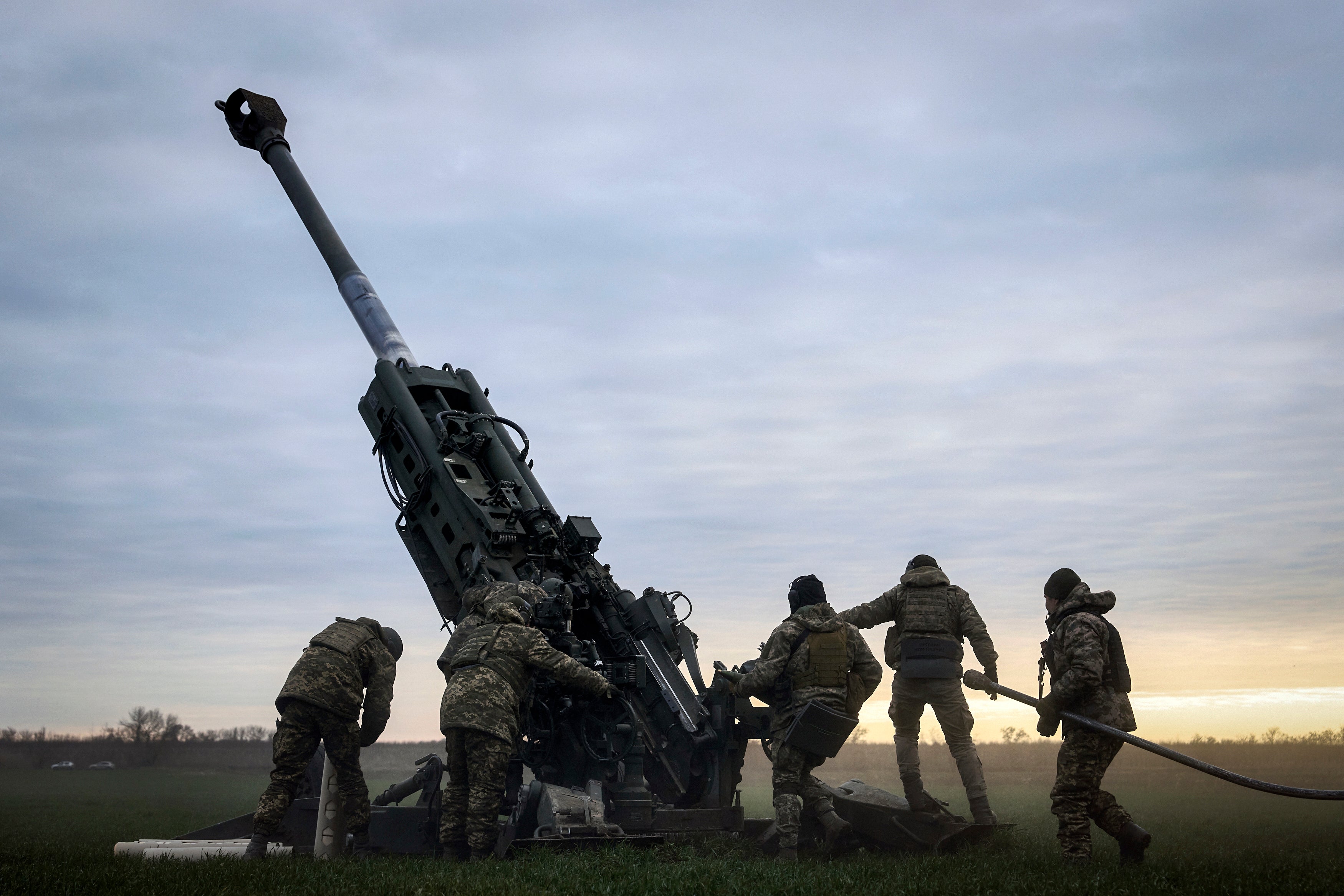Ukraine ‘conducting raids’ across Dnipro river to dislodge Russian troops ahead of expected offensive
Raids come as UK intelligence suggests Russia is scaling back its attacks to prepare for a fresh Ukrainian assault

Ukrainian forces are frequently carrying out raids across the River Dnipro near the southern city of Kherson to try to dislodge Russian troops, an official has said.
Russian forces have held the eastern side of the Dnipro near Kherson since retreating from the city in November after months of occupation, but Ukraine is expected to launch a spring counteroffensive to try to recapture more territory.
Yuriy Sobolevskiy, deputy head of the Kherson regional administration, said the raids were intended to reduce the combat capability of Russian troops who have been shelling Kherson city since being forced to retreat. “Our military visit the left [eastern] bank very often, conducting raids. The Ukrainian armed forces are working, and working very effectively,” Mr Sobolevskiy told Ukrainian television.
“The results will come as they did on the right bank of the Kherson region when, thanks to a complex and long operation, they were able to liberate our territories with minimal losses for our military. The same thing happens now on the left bank.”
Russia seized the Kherson region soon after its full-scale invasion of Ukraine 14 months ago, and has continued since then to hold all of the region’s territory east of the Dnipro.
Military analysts say Ukraine is likely soon to launch a counteroffensive, and that one of the main goals could be breaking through a southern land corridor between Russia and the Russia-annexed Crimea region. Retaking all of the Kherson region would be an important step towards achieving this goal.
The US-based Institute for the Study of War said last week that Russian military bloggers had posted enough geolocated footage to confirm that Ukrainian troops have established a foothold on the eastern bank of the Dnipro.
Mr Sobolevskiy gave no further details, saying a military operation requires “informational silence”.
It comes as British intelligence said that Russian casualties had dropped by almost a third across April, with the Ministry of Defence suggesting that this is due to Moscow scaling back its attacks to focus on preparing for the long-expected Ukrainian counteroffensive. The MoD said an analysis of figures published by Ukraine’s general staff showed that the average daily number of Russian casualties has dropped from 776 in March to 568 this month.
Ukraine also reported that a Russian missile struck a museum in the centre of the eastern Ukrainian city of Kupiansk on Tuesday, killing two women and wounding 10 other people. Rescue workers dug through mounds of rubble to retrieve the bodies after the local history museum was hit by what president Volodymyr Zelensky’s chief of staff and the regional governor said was a Russian S-300 missile.
Yulia, a resident who gave no surname, said she had been at the post office when she heard three explosions in the morning attack.
“Civilians are suffering every day ... today’s attack took place at 8.55am, the ... museum was hit, and I guess some people were injured or died there. Civilians, not soldiers. There were no weapons there,” she said.
Mr Zelensky posted a video of a devastated building that had spewed out rubble and debris into the street. Its windows were smashed and a section of the wall and roof was destroyed. “The terrorist country is doing everything to destroy us completely,” he wrote in a Telegram post. “Our history, our culture, our people.”
Russia did not immediately comment on the attack. It denies deliberately targeting civilians in its full-scale invasion that has killed thousands of people, uprooted millions and flattened buildings in cities, towns and villages across Ukraine.
Kupiansk, which had a pre-war population of 26,000, is an important rail hub that was occupied by Russian forces for months after they invaded Ukraine in February 2022. Ukrainian forces drove them out of Kupiansk last September.
Elsewhere, Sweden’s foreign ministry said it was expelling five Russian diplomats for conducting activities incompatible with their diplomatic status, saying the government took the security threat posed by Russian intelligence gathering very seriously.
Russia’s embassy in Sweden declined to comment on the development. Russia and Western countries have engaged in tit-for-tat expulsions since Moscow invaded Ukraine.
“Five people who are employed at the (Russian) embassy have been asked to leave [Sweden] as a result of activities that are incompatible with the Vienna Convention on diplomatic relations,” a Swedish foreign ministry statement said. The ministry declined to specify the activities involved, but said the Swedish security service had reported that Russia had continuously engaged in intelligence gathering in Sweden.
“This is a security threat that the government takes very seriously,” it said.
Sweden’s Security Service declined to comment on the case, but said it has long warned that Russia used diplomats to spy on Sweden.
Concerns have grown in many countries over Russian intelligence activities, with Swedish security police singling out Russia as a serious threat to the security of the Nordic country, which is seeking membership of Nato.
Earlier this month, Norway expelled 15 Russian embassy officials it described as intelligence officers operating under diplomatic cover. Sweden expelled three Russian diplomats in April last year, while Germany, the Netherlands, France and Belgium also expelled officials a year ago over alleged spying.
Reuters






Join our commenting forum
Join thought-provoking conversations, follow other Independent readers and see their replies
Comments